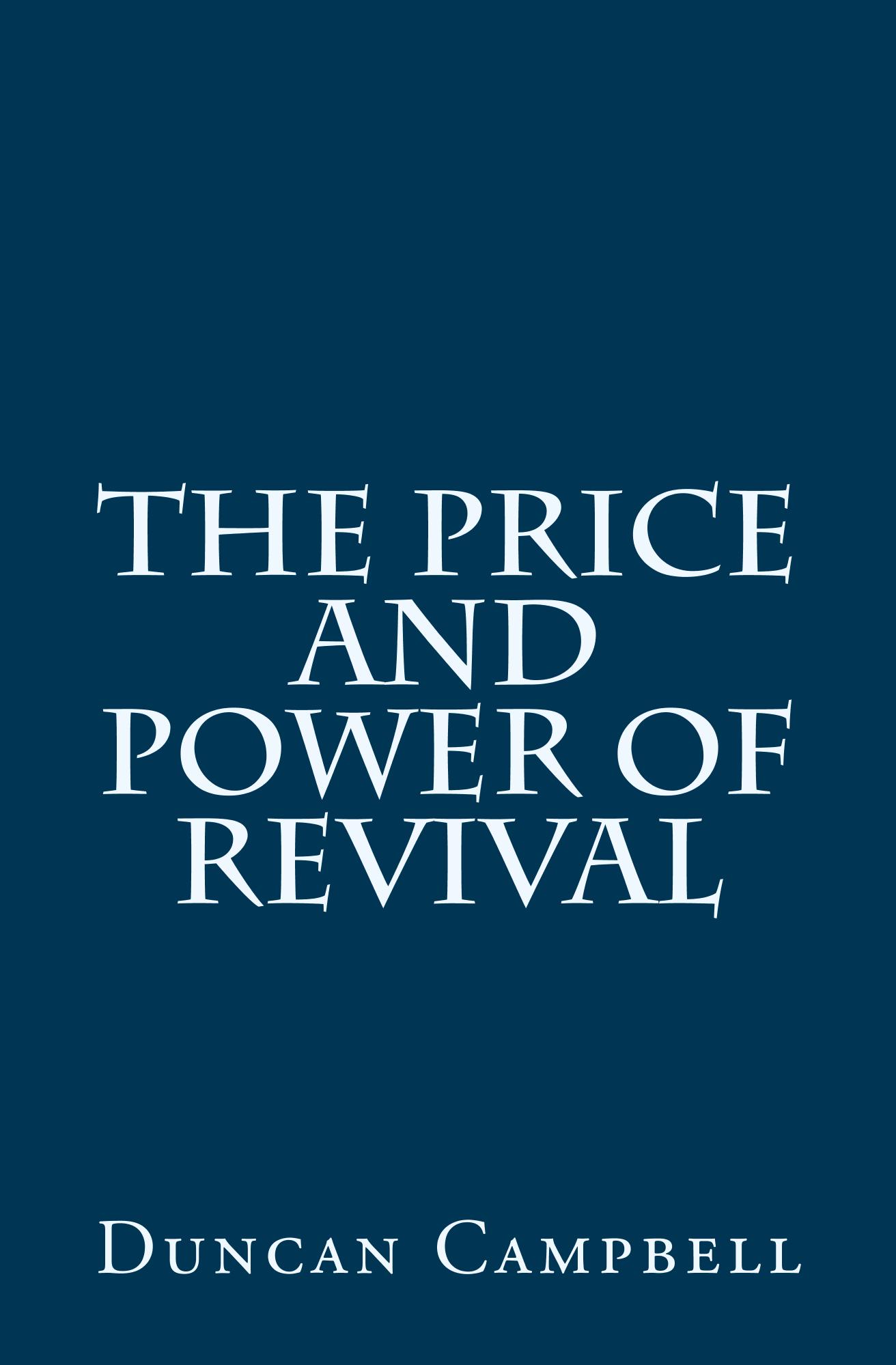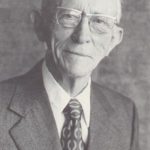Description
The PRICE and POWER of REVIVAL
by
Duncan Campbell
2015
Foreword
These few short chapters owe their origin to the spiritual awakening that swept Lewis-and-Harris, one of the Outer Hebrides Islands off the northwest coast of Scotland, during 1940-1953. The council districts of Lewis and Harris together, covering 770 square miles, form by far the largest of this fascinating group of islands. The distance from Rodel in the extreme south to Port of Ness in the north, is nearly sixty miles. The population is about 25,000. Of these, some 3,700 are in Stornoway, the only large town. Of the other 21,000, some are in very lonely places but most are in more or less compact villages; and in several localities these villages are so near together as to constitute a large community within the compass of a few miles. These 21,000 people are almost wholly occupied in small-scale farming, or crofting, and in weaving – on looms in their own homes – the world-famous Harris tweed which, it is estimated, amounts to something like four million yards a year. Many still live in picturesque thatched cottages and Gaelic is universally spoken. The people are instinctively and traditionally religious, with still much of the old-time reverence for God, His Word, and the ordinances of His Church.
To this island came Duncan Campbell in December, 1949, and he certainly was “a man sent from God.” The divine initiative and element in this movement are evident to all who know the sequence of events. Two years previously Mr. Campbell was a Presbyterian minister in a Lowland industrial community. Himself a Highlander, Mr. Campbell became possessed of a great concern to devote himself to Gaelic-speaking evangelizing in the Highlands and Islands; and after more than a year of prayerful consideration, he rejoined the Faith Mission in January, 1949, for this work, having been engaged in similar work in the Mission previous to his twenty-five years in the ministry of the United Free Church of Scotland.
But it was to the Island of Skye he felt he should go, and during a succession of missions in that island with manifest awakening, he wrote: “How glad l am that I did not yield to my own inclination and go to Harris; I believe my work is in this very needy island. I have invitations from all over the island.” And later: “I have a pressing invitation to go to Harris … but my very strong leaning is to continue in Skye.”
When, therefore, in October an urgent request came from praying people in the village of Barvas, Lewis, through their minister for Mr. Campbell to go there, his commitments on Skye gave little hope of his being free to go, and his committee felt he should keep his engagements. But Mr. Campbell himself felt he was being led to Lewis – a conviction which deepened – and unforeseen changes released him so that within only a few weeks he was there.
Whole communities were mightily moved as “God came,” and the following instance is typical of the scenes witnessed in the churches and in the homes of the people throughout the island: “… a crowded church, the service is over, the congregation reluctant to disperse stands outside the church in a silence that is tense, Suddenly a cry is heard within; a young man, burdened for the souls of his fellow men, is pouring out his soul in intercession. He prays until he falls into a trance and lies prostrate on the floor of the church. But Heaven has heard and the congregation, moved by the power of God, comes back into the church, and a wave of conviction sweeps over the gathering, moving strong men to cry for mercy. This service continued until the small hours of the morning, but so great was the distress and so deep the hunger which gripped men and women that they refused to go home though others were already assembling in another part of the parish; and a number of those who now made their way to the church were moved by a power they had not before experienced. Others were deeply convicted of sin and crying for mercy in their own homes before coming near the church. None who were present at this early morning visitation will forget the moving scenes — some weeping in sorrow and distress, others with joy and love filling their hearts, falling upon their knees, conscious only of the presence and power of God who had come in revival blessing. Within a matter of days the whole parish was in the grip of a spiritual awakening. Churches became crowded, with services continuing until three o’clock in the morning. Work was largely put aside as young and old were made to face eternal realities.”
Such is the background of these chapters.
P .S. Bristow
CHAPTER ONE
“Now the things which I write unto you, behold, before God, I lie not. Afterwards, I came into the regions of Syria and Cilicia; and was unknown by face unto the Churches of Judaea which were in Christ; but they had heard only, that he which persecuted us in times past now preacheth the faith which once he destroyed. And they glorified God in me” Gal. 1:20,24.
This quotation is a snatch of autobiography; Paul is here telling of his life prior to his conversion. In verse 18 he tells of how he persecuted the Church of God. He then goes on to speak of that great hour when God met with him; he refers to the effect of that great experience. Conversion to the Apostle was something intensely real, to him as to all others; the outstanding evidence was in the cleavage this inner revelation and realization brought about. All this he attributes to the sovereign mercy of God. Paul believed that in the whole field of Christian experience the first step is with, and remains with, God. Thought, feeling and endeavor must find their basis and inspiration in, the sovereign mercy of God. I wish to draw attention, to three thoughts from the scripture quoted:
- The Divine in the human.
- The Divine manifested through the human.
III. God glorified in this manifestation.
The Divine in the human: In God’s creative plan, man holds a unique place, distinct in this respect that he alone of God’s creation is capable of God-consciousness. “This consciousness, or feeling, is as much a verity as any other fact of human consciousness:
I’ve heard people say, “Oh don’t, don’t bother about feeling.” Now I quite understand what they mean. You may know about God without having feeling; knowing about God has to do with the intellect, but you cannot know God and not feel it. “God revealed His Son in me” and” this hope we have as an anchor of the soul, both sure and steadfast.” Was that not a consciousness, a realization? Listen to Moody’s testimony on this great truth – “One day in the city of New York, oh what a day, I cannot describe it, it is almost too sacred an experience to name, I can only say that God revealed Himself to me and I had such an experience of His love that I had to ask Him to stay His hand.” Were you ever there brother? Oh, I ask you, were you ever there? Some of us have been there. “I went on preaching,” cried Moody, “the sermons were not different, yet hundreds were now converted.” God in personality. Surely that is what McCheyne referred to in that letter to Andrew Bonar; a letter that I saw; a letter written in his own hand. “Andrew,” is what he said, “I seem to know Jesus Christ better than any of my earthly relatives.” My brother, my sister, do you know Jesus in that way? Is Jesus, this divine revelation bringing this glorious realization, is that supreme in your personality, or is it just a decision; is it just a resolution; is it just a text or a verse of Scripture? You can make decisions, you can come to a resolution, you can cling to a verse of Scripture and be doomed and damned for ever. NO, I say that the ultimate reality in the realm of Christian experience is simply this, that salvation is of God.
A Christian is a supernatural being who has had a supernatural experience, and that is something more than singing choruses; that is something more than making a decision; that is something more than becoming a member of a church; that is something more than enjoying Conventions. It is God at the centre of my life.
How does this become actual and real?
When I realize that what we call a presence, in reality is a life. Paul sums up the whole thing clearly in his letter to the Philippians. There he gave the divine conception of the Christian life, “For me to live is Christ.” He does not say, “For me to live is to try to be like Christ, for me to live is to imitate Christ.” Thomas a Kempis’ book “The Imitation of Christ,” is a very wonderful book, and a book that has been blessed to countless thousands, but, with all due respect to Thomas a Kempis, you cannot imitate Christ. But I will tell you what you can do. You can allow the Holy Spirit to reveal Christ, so that His glorious personality is incorporated in your being, and then it is not your winsomeness, it is not your trying, it is Christ. That is why I never sing that unscriptural chorus that you sometimes sing, “Let the beauty of Jesus be seen in me.” Remember that line that speaks of “all my nature refine.” Can your nature be refined? We should alter it, and substitute the words “make all Thy nature mine and then the beauty of Jesus shall be seen in me.” Not my struggling, not my trying, but Jesus in me expressing Himself through me. Was it not that great saint of God, Oswald Chambers, who said, “Sanctification is allowing the perfections of Jesus to express themselves through your personality.” Oh, how we need to proclaim this truth, especially in these desperate days when countless thousands, particularly in the field of youth, are frustrated and baffled. I had them coming to me in the Universities; I had them at Keswick, asking “Is there deliverance from sin? Can we know emancipation? Must this damnable serpent ever remain in my bosom?” Let us discover the secret that all the resources of the Christian life are in Christ Himself, as He lives in me, by His Spirit.
Frequently I say that the baptism of the Holy Spirit in its final analysis is not manifestations, it is not gifts. The baptism of the Holy Spirit in its final analysis is the revelation of Jesus. “God revealed His Son in me.”
This takes me to the second thought, the Divine manifested through the human. Jesus said, “He that hath seen Me hath seen the Father,” and John adds, “As He is so are we in this world,” suggesting that the Divine nature cannot be hidden. It must, and it will, express itself. How does He express Himself? We have the answer in verse 16, “God revealed His Son in me that I might preach Him.” This truth is wonderfully demonstrated in Luke’s Gospel, in chapter eight, where we read that “Jesus went throughout every city preaching and showing the glad tidings.” It is one thing to preach the glad tidings; it is quite another thing to show the glad tidings. But here you have the glad tidings becoming visible through a God-possessed personality. Yes, vital Christianity is a witnessing Christianity, and its witness is to life; a life centered in a Person. Carlyle was right when he cried, “Holy living is the best argument that tells for God in an age of fact.” And was it not the same man who said, “Words have weight when they have a man behind them.” And I say that your testimony and my preaching have weight only when they have the Man Jesus Christ behind them. Some years ago it was my privilege to share a room with that great Indian mystic, Sadhu Sundar Singh, and I remember a story he told us of a conversation that he had with a Professor of Comparative Religions in the University of Cambridge. “Tell me,” said the Professor, “what have you found in Christianity that you did not find in your old religion?” The Sadhu replied, “Professor, I found the dear Lord Jesus.” “Oh, yes, I quite understand, but what particular principle or doctrine? Tell me, what new philosophy have you found in Christianity that you did not find in your old religion?” And again the Sikh replied, “Professor, I found the dear Lord Jesus.” You see, his witness was to a Person and not to a principle; to a life, and not to a philosophy: Christ was real.
Further, this life announces itself in delivering power. Note the wording of verse 4. “He gave Himself for our sins that He might deliver us.” Now the reference there is to the substitutionary work of Christ that declares that He died for our sins, but I think it is important for us to see that in the Cross there is a further fact, and a deeper meaning; a fact that takes us beyond the substitutionary work. Is it possible to get beyond the substitutionary work? I say yes. It is the fact of my identification with Christ in death, and in resurrection, and I want to suggest that this is the thought that gripped Professor James Denny when he spoke of the conscious theology of the atonement. Not just the objective aspect of His atoning sacrifice, but the subjective aspect “bearing about in the body the dying of the Lord Jesus, that the life also of Jesus might be made manifest in our body.” Oh, you say, but I’ve got the old man, he’s always about me. Yes, I believe that, but this truth tells me, this truth declares that there is a way through which the old man can be dealt with; a way through which the governing principles of sin can be dealt with. Paul is speaking of an experience that is vital and that is gloriously real, when he cries, “The law of the Spirit of life in Christ Jesus hath made me free.” What does it mean?
It means deliverance from sin. God dealing with root principles, and when He deals with that he deals with the old man. We had one of London’s leading ministers preaching in Edinburgh. He was giving a series of addresses on Paul’s letter to the Romans, and on this particular night he was speaking about the old man, and in the course of his address he said this: “There is only one thing you can do with the old man, and that is to starve him, starve him.” I have heard that again and again, but I had some light thrown on it that evening. There was sitting, beside me an elderly gentleman from the city of Glasgow. He was a bit deaf; he didn’t catch everything, so turning to me he said, “Excuse me, sir, but would you tell me what he said about the old man?” I said to him, “He suggests that the only thing that we can do with the old man is to starve him.” “Starve him, did he say, that would not do with mine. He carries about with him a good supply of emergency rations; I cannot starve him.” I smiled, but the old man was right.
“The law of the Spirit of life … hath made me free from the law of sin and death.” May God help us to discover that the secret of victory, and the secret of emancipation from indwelling sin, is to come under the complete control of the risen Son of God. And when I get there, Scripture declares there is “no part dark.”
As the third thought in the quotation, the last verse speaks of God being glorified in us. This surely is the ultimate reality and the supreme wonder of human existence, that God can be glorified in us.
In other words – we are to be “living epistles.” After all, the greatest contribution you or I can make to the cause of Christ, is the impact of our unconscious influence, and that influence impregnated by the life of Jesus.
We will have failed in our object, unless we bring back to our schools, our colleges, our homes and our common task, something of the uncommon fragrance of Jesus.
So let us yield to His indwelling that Christ may be able to express His loveliness through us.





Reviews
There are no reviews yet.